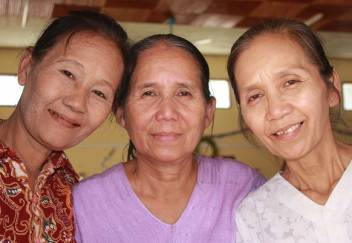 On the road to Mandalay, the HelpAge International Myanmar team and I recently took a detour to visit the older people’s self-help group at Baw Gone village in Pyin Oo Lwin Township.
On the road to Mandalay, the HelpAge International Myanmar team and I recently took a detour to visit the older people’s self-help group at Baw Gone village in Pyin Oo Lwin Township.
Since moving to Myanmar in July 2012, this was my first opportunity to visit one of our projects and I was particularly interested to see the impact of our work.
The remote village of Baw Gone is located in a rural landscape of rickety dirt roads, dappled with wild sunflowers and winding creeks that lace through a jade-coloured hillside.
While picturesque, and a stark juxtaposition to the teeming streets of Yangon I have become accustomed to, the communities here are living in considerable poverty. The populace comprise mostly of poor farmers whose incomes are highly dependent on the seasons.
Community-based pensions
The occasion for my visit was to attend a ceremony launching the older people’s self-help group’s new “Endowment Fund” and a community-based pension initiative that will start in early January.
Currently Myanmar doesn’t have a national social pension system, and it was heartening to learn that despite this the older people from Baw Gone had mobilised to organise support for the most vulnerable people in their community. To me, this demonstrates the potential for self-help groups to take ownership and make meaningful and sustainable change.
Among the notable guests attending the event was U Aung Tun Khaing, Deputy Director General for the Department of Social Welfare, who spoke on behalf of the Union Minister for Social Welfare, Relief and Resettlement Dr Myat Myat Ohn Khin. During his speech U Aung Tun Khaing highlighted the work of the group and commended them on their initiative and achievements.
An enduring impact on community development
The Baw Gone group was formed in 2009, when HelpAge collaborated with the National YMCA on a project to support twenty of the most marginalised villages in Myanmar. The project was funded by the European Commission and co-funded by KOICA (Korea International Cooperation Agency) and ran until February 2012. It has helped over 10,000 older people and their families by setting up community-based organisations.
Since the project ended, the Baw Gone group has continued to work in the community and carry on with their monthly meetings and activities. It was during one of these meetings that the members developed the concept of a community-based pension scheme, deciding to donate money raised through the group to the oldest and frailest people in the village.
Through an initial donation fee of 10,000 kyat ($8.5 USD), fundraising ventures and profits collected from low interest loans provided through the group fund, the older people’s self-help group has raised over 1,500,000 Kyat ($1,300 USD). They will use this money to support five recipients in the community who are aged over 75.
When I spoke with U Pu, leader of the group in Baw Gone, he told me: “Starting in January we will provide the five oldest people in our village with a monthly grant of 5,000 kyat ($6 USD). We will also provide an emergency healthcare grant to those who need it. We will start with an age limit of 75 this year but next year we hope to lower the age [of eligibility] to 74 and provide pensions to more people.
“[The beneficiaries] can use the money to put towards whatever they like. If they are happy, we are happy. We hope we can pass this on to the next generation to continue.”
Age Demands Action in Myanmar
On 1 October, as part of the Age Demands Action campaign in Myanmar, leaders from Myanmar’s 128 groups, including Baw Gone, met with the Minister for Social Welfare, Relief and Resettlement to present her a memorandum.
The document requested the Minister’s support in the development of protection mechanisms for older people, such as social pensions, subsidised transport and health services and the enactment of a National Plan on Ageing.
This was the first time members of the groups had had the opportunity to meet with such a high-level government official. We have been advised that the memorandum has since been forwarded to the President’s Office and look forward seeing some of the requests come to fruition.
Find out more about our work in Myanmar.
